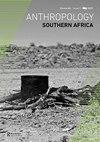The role of “food” in network formation and the social integration of undocumented Zimbabwean migrant farmworkers in the Blouberg-Molemole area of Limpopo, South Africa
IF 0.9
3区 社会学
Q3 ANTHROPOLOGY
引用次数: 3
Abstract
This article examines the role of food in mediating social relations between undocumented Zimbabwean migrant farmworkers and other Zimbabweans living and working in the Blouberg and Molemole local municipalities in Limpopo province, South Africa. Based on ethnographic research, the article reveals that food, besides the utility of its physical matter as a necessity to satiate hunger, has a deeply embedded social meaning through which relations and modes of belonging can be expressed. This social meaning is best understood by invoking the concept ukama igasva hunozadziswa nekudya [a relationship is not complete until there is food]. Food mediates reciprocal social exchanges that lighten the burden of precarious working conditions associated with agricultural labour and reinforce a sense of belonging and oneness. Food also lubricates mutually supportive networks between undocumented farmworkers and Zimbabwean citizens working in other sectors. The article concludes that using ukama igasva hunozadziswa nekudya as an analytical concept provides rich explanations of the role of food in unifying the Zimbabwean migrant community in Limpopo. Food facilitates the production of macro-level connections in which individual Zimbabwean migrants, irrespective of their professional pursuits, identify with the larger network cluster based on citizenship.“食物”在网络形成和无证津巴布韦移民农场工人的社会融合中的作用在林波波,南非的布洛伯格-莫尔莫尔地区
本文探讨了食物在调解无证津巴布韦移民农场工人和其他津巴布韦人之间的社会关系中的作用,这些人生活和工作在南非林波波省的Blouberg和Molemole当地市政当局。基于民族志研究,本文揭示了食物除了作为充饥必需品的物质效用外,还具有深刻的社会意义,通过这种意义可以表达关系和归属模式。这种社会意义最好通过引用ukama igasva hunnozadziswa nekudya(一段关系直到有了食物才算完整)这个概念来理解。粮食促进了互惠的社会交流,减轻了与农业劳动相关的不稳定工作条件的负担,并加强了归属感和统一性。粮食也润滑了无证农场工人和在其他部门工作的津巴布韦公民之间相互支持的网络。文章的结论是,使用ukama igasva hunozadziswa nekudya作为一个分析概念,为食物在统一林波波津巴布韦移民社区中的作用提供了丰富的解释。粮食促进了宏观层面联系的产生,在这种联系中,津巴布韦移民个人,无论其职业追求如何,都与基于公民身份的更大网络集群相认同。
本文章由计算机程序翻译,如有差异,请以英文原文为准。
求助全文
约1分钟内获得全文
求助全文

 求助内容:
求助内容: 应助结果提醒方式:
应助结果提醒方式:


